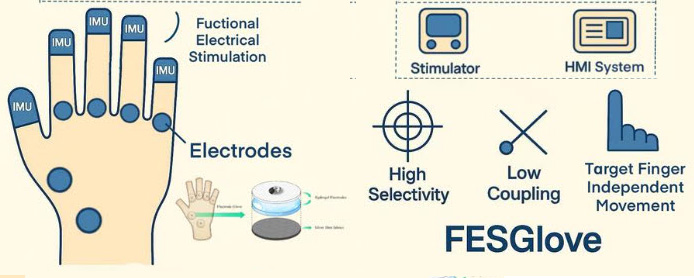A new glove-based system that uses functional electrical stimulation (FES) to activate individual fingers could offer a more effective way to support hand rehabilitation in people recovering from stroke or spinal cord injuries.
The FESGlove delivers targeted electrical stimulation to specific hand muscles and nerves, offering greater selectivity than many current systems, which often cause unintended finger movements by stimulating larger forearm muscles. The device features 10 independent stimulation channels and combines silver fiber and hydrogel electrodes within a stretchable glove. Users can adjust settings like frequency, current amplitude, and pulse width to suit different needs.
The FESGlove isn’t just for a clinical setting—they can be used at home, allowing for longer, more frequent, and more convenient rehabilitation sessions. The benefits include:
- Improved dexterity: With targeted stimulation, users can practice fine motor skills needed for tasks such as grasping small objects.
- Increased muscle strength: Repetitive, functional movements performed with the glove help rebuild strength in weakened hand muscles.
- Reduced spasticity: The technology has been shown to reduce muscle tone and spasticity, especially in the wrist, which can interfere with movement.
- Enhanced independence and quality of life: By enabling users to perform daily activities with greater ease, FESGlove could restore confidence and significantly improve quality of life.
- Motivation for therapy: For many users, being able to perform tasks they haven’t been able to do for years provides powerful motivation to continue with their therapy.
Developed by researchers at the University of Bath and Shanghai Jiao Tong University (and published in the journal Neuroelectronics in June 2025) , the glove was designed to overcome limitations in traditional rehabilitation techniques that often fail to restore the fine motor control needed for tasks like buttoning a shirt or typing. The research team sees the FESGlove as a potential platform that could eventually be integrated with brain-computer interfaces and other advanced neurorehabilitation tools.
A quick warning: FES treatment is not for everyone. They are most effective when the nerve pathways between the spinal cord and the hand muscles are still intact. Contraindications include having a pacemaker, defibrillator, or uncontrolled epilepsy. As with any medical device, consultation with a healthcare professional is necessary to determine suitability.



